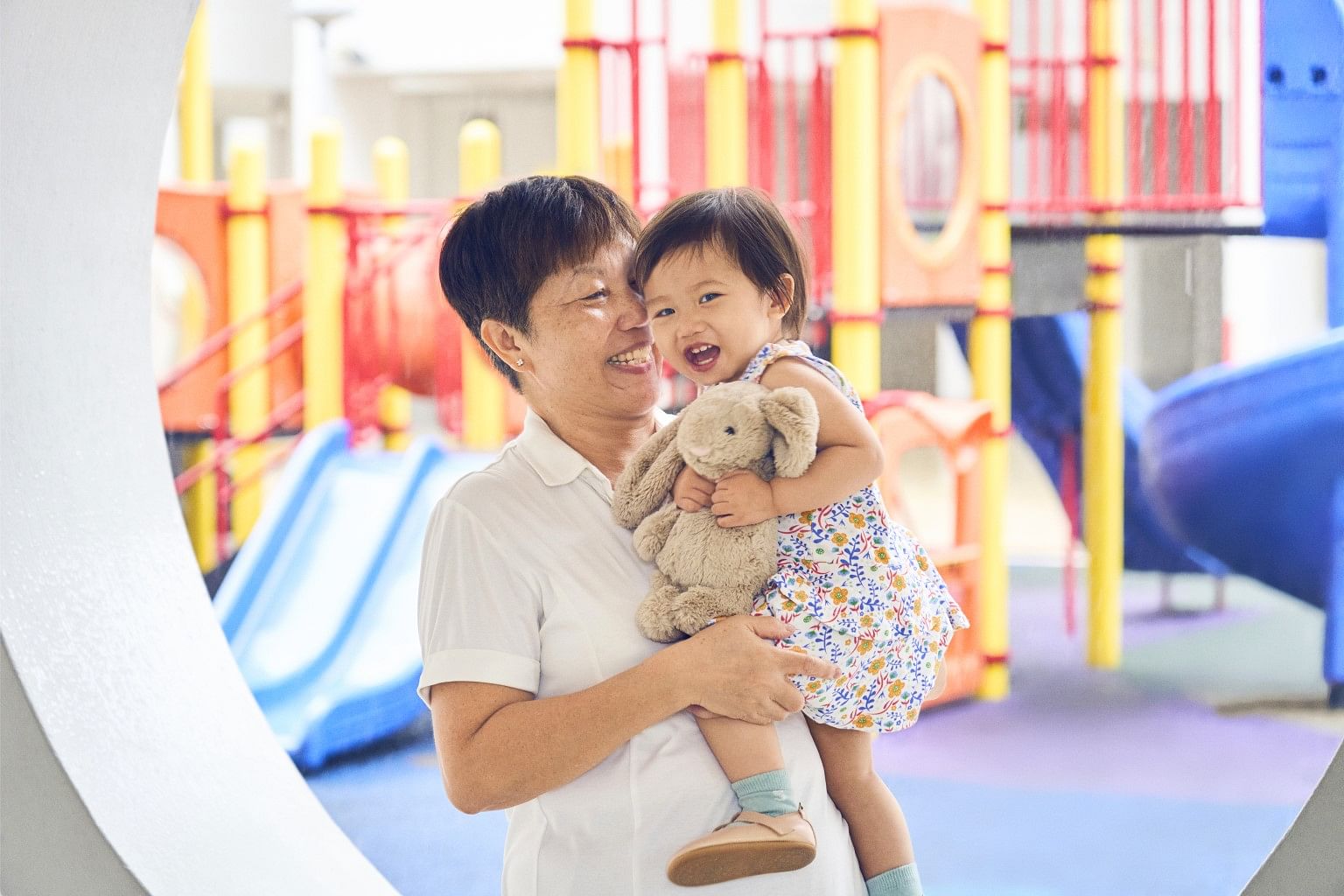BRANDED CONTENT
Happily brewing lattes at 62: 'Working here gives me freedom and time for my grandchild'
Flexible work arrangements allow employers to hire from a broader pool of workers, including experienced seniors like this barista

Being on a permanent morning shift gives Mdm Valerie Poh the time to care for Olivia, her toddler granddaughter, in the afternoons. PHOTO: SPH MEDIA
Follow topic:
When this sprightly barista became a grandmother in 2022, she decided to make an “audacious” request to her employer.
She asked to be put permanently on the morning shift.
Having worked in retail – she was in the jewellery sector for 19 years – and then working in the food and beverage (F&B) industry since 2015, Madam Valerie Poh was well aware that staff demands and shift rostering were often rigid, making it tougher for flexible work arrangements (FWAs) to be implemented.
Watch this video to find out how working reduced hours can give you more time to upgrade your skills.
“You have to follow the company shift rotation, and you take it or leave it,” says the 62-year-old.
Or so she thought.
As she wanted to help with caring for her new granddaughter and to have more time for herself, the cafe barista requested for the permanent morning shift from Starbucks, her employer of eight years, as she admits she is a “morning person” by nature.
Watch this video to learn more about how to effectively manage your work and personal commitments.
Much to her surprise, her employer said yes. “I’ve been looking for such an arrangement for many years but there’s no such thing as a permanent morning shift. When Starbucks said yes, I was so shocked. I really appreciate that.”
Now, working from 7am to 3.30pm, five days a week, Mdm Poh, affectionately known as Auntie Val among her colleagues, finds herself with significantly more time and energy in the afternoons and evenings.
She can dedicate these precious hours not only to her grandchild and daughter, but also to her family and friends.
And she has discovered the value of self-care and the joy of “me time”.
“I cannot describe this feeling, but I can tell you that I really feel good,” says Mdm Poh.
Work-life harmony in the service industry
The F&B industry often demands gruelling hours and rotating shifts, making it challenging to attract and retain employees, especially older workers who prefer not to endure up to 12 hours on their feet.
For Mdm Poh, who still enjoys her work, opting for reduced hours on her preferred schedule strikes the perfect balance.
She also draws energy from the youthful Starbucks work atmosphere, which has introduced her to all things trendy and new.
“As I work with a group of young people, I'm not left behind when it comes to trends — I feel youthful,” she says, adding that she has also learnt more about popular culture, such as trending BlackPink songs.

Mdm Poh's morning cheerfulness is a constant at her Starbucks outlet. PHOTO: SPH MEDIA
Starbucks says its core mission has always been putting its employees – whom the company calls “partners” – first.
Starbucks partner resources director Celestina Lee says: “We believe in creating a positive work environment where all Starbucks partners feel welcomed, supported and engaged.”
Managers regularly check in with their team members to address their personal needs and proactively support them. “When our partners feel supported and engaged, they create the experience our customers have come to expect and love from us,” adds Ms Lee.
With shorter work hours and more energy to spare, Mdm Poh has also carved out quality time for herself to enjoy movies and high tea sessions, play mahjong, go for yoga and qigong sessions, and reconnect with old friends.
Now, she firmly believes she can continue working at Starbucks for many more years, given its support for FWAs, her familiarity with the work and the deep sense of loyalty and trust she shares with the company.
“That’s why I've stayed for eight years and, who knows, maybe I'll stick around for another eight,” she quips with a laugh.
Embracing FWAs in HR strategy
Human resources expert Pauline Loo acknowledges the benefits for companies like Starbucks that have well-designed FWAs.
“Companies are adopting progressive and adaptable work arrangements to accommodate their diverse workforce, considering different stages of their employees' lives,” says Ms Loo, a senior professional from the Institute for Human Resource Professionals (IHRP).
Established to professionalise and strengthen human resources (HR) practice in Singapore, the IHRP sets key standards of excellence for HR and human capital development in organisations.
Workplace flexibility has enabled senior workers like Mdm Poh to continue contributing to the workforce, and fostering a greater sense of commitment. As Ms Loo puts it, there are “mutually beneficial outcomes for both the organisation and employees”.
In the case of Mdm Poh’s permanent morning shift, Starbucks has succeeded in retaining an experienced service front-liner. This balances out the working hours, as a large proportion of the company’s younger, part-time staff cannot work in the mornings because of school commitments.
The company hopes Mdm Poh will decide to stay for a long time.
Starbucks’ Ms Lee says: “The current retirement age at Starbucks is 65, so Auntie Val will only retire in 2026. But with her high energy and sunny personality, we hope she will want to continue working past 65 and will take on re-employment with us.”
Making time for career advancement
While Mdm Poh has embraced flexible work to enrich her personal life, her colleague, Mr Muhammad Nuh Fadhli Bin Zahari, managed to tailor his schedule to further his studies.
The 30-year-old embarked on a part-time diploma in business practice (business administration) at Temasek Polytechnic, a journey entirely sponsored by Starbucks, in 2019.
Over the course of two years, Mr Fadhli diligently attended online classes three times a week, from 7 to 10 pm. He fulfilled his responsibilities as a store manager, overseeing a team of 10, during the day.
“I was able to adjust my schedule to take on the morning shifts, ensuring that I could balance my work and studies,” says Mr Fadhli.

Now a full-time store manager, Mr Muhammad Nuh Fadhli Zahari (right) better understands the company's business operations, thanks to his diploma in business practice. PHOTO: SPH MEDIA
The diploma course was directly aligned with his role, enabling him to implement enhancements at the store, such as reconfiguring visual merchandising displays to capture more customer attention.
Mr Fadhli's journey with Starbucks began in 2016 as a part-time barista, armed with an O-Level certificate. Now, as a full-time store manager, he proudly holds a diploma that deepens his comprehension of the company's business operations.
He envisions assuming even greater responsibilities at work and remains open to the possibility of pursuing a higher or specialised diploma or part-time degree while still being a part of Starbucks.
“It's very achievable,” he says. “If I could do it during those two years from 2019 to 2021, I believe I will be able to replicate that commitment towards my studies and my work.”
Ms Lee says Starbucks has always emphasised the importance of continuous training and the career development of its employees.
“Full-time and part-time partners have equal opportunities. We deeply believe in an environment where leaders supporting work-life harmony will inspire individuals to give their best and grow with the company,” she says.
Creating a welcoming work environment
Starbucks has designed a wide range of FWAs. “What are now commonly called FWAs are practices we have provided to our partners since we opened our very first store in Singapore in 1996,” says Ms Lee.
One example is its Find-a-Shift app, which allows store employees looking for more hours to book shifts at different locations. Another is its Coffee Break programme which rewards staff who have completed 10 years of service with the option of taking six months to a year off.
In between, the company caters to the needs of employees like Mdm Poh and Mr Fadhli who are at different stages of their personal and professional lives.
With its FWAs in place, Starbucks reports a lower-than-average resignation rate of 1.9 compared to the industry’s 3.1 recorded by the Ministry of Manpower in its 2023 Labour Market Report (Third Quarter).
Ms Lee says: “As our partners grow with us, we see them through different life stages. This includes many partners who choose to work with us after pregnancy, and we've seen young mothers requesting to switch to part-time work to spend more time with their children in the initial years.”
Ways to adopt FWAs
Employers can adopt FWAs that best suit the needs of their organisation and employees, such as:
- Flexi-time allows employees to adjust their work hours to suit their productivity and personal needs, while still fulfilling the total agreed-upon work hours for an accounting period, such as a week or a month.
- Staggered Time enables employees to vary their daily start and end times, usually within a specified time band, which includes designated core working hours.
- Flexi-shift allows employees to choose from different shifts, enabling them to work on specific days or hours to accommodate their personal responsibilities, such as caregiving.
- Flexi-place lets employees work from a location other than the traditional workplace, including home or other places such as a co-working space or satellite office.
- Flexi-load allows employees to opt for a reduced workload, with remuneration and benefits being pro-rated accordingly.
- Ramping Up or Ramping Down enables employees to manage career transitions, such as returning to work after an extended leave or transitioning into retirement. For example, an employee may start by working part-time and gradually increase their working hours to transition into a full-time position.
In partnership with the Ministry of Manpower

